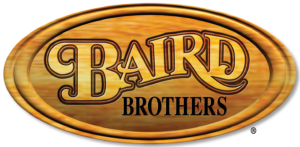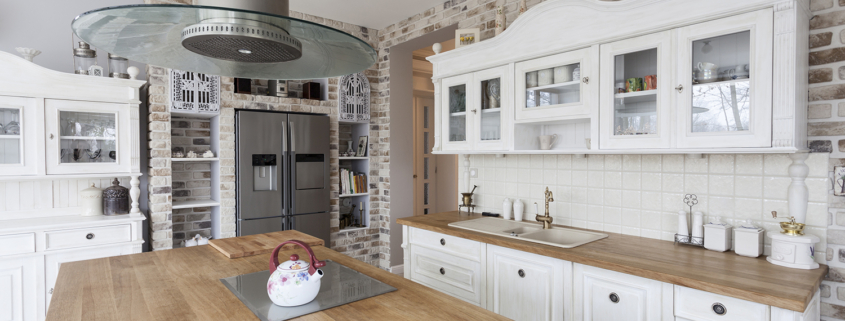Kitchen Design: Butcher Block Countertop Pros and Cons to Consider
If you’re thinking of redoing your kitchen countertops, picking the right countertop surface can be a challenge. Obviously, you want something that will last. You don’t want something that requires a ton of upkeep. And, hopefully, in the end, it won’t break the bank.
So, with all of that, have you ever considered wood plank or butcher block countertops? Using wood in your kitchen renovation can add a touch of timeless charm to the space – and these unique styles are definitely on-trend. But still, we’re sure you’re wondering, “Are wood countertops really a good choice?”
Our answer is short and sweet! They sure are!
Let’s take a quick look at the butcher block countertop pros and cons compared to other countertop materials, and you’ll see why so many restaurants and homeowners alike choose to use them in their kitchen design.
Wood Countertops vs. Other Countertop Materials
Wood counters, stone countertops, granite countertops, stainless steel countertops and laminate countertops are all popular interior design choices. When starting your kitchen remodel, you may not be sure which to choose.
When selecting the best countertop material, you need to consider how heat resistant it is, how it will stand up to water damage and warping, and what its overall lifespan is compared to the cost of the material. Here’s how butcher block counters stack up in these crucial categories against other countertop surfaces.
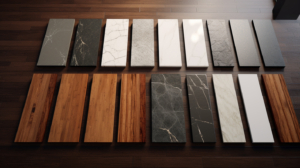
Butcher Block Countertop Pros
-
-
-
Lifespan
-
-
With the right upkeep, butcher block countertops can last decades. This places them on par with other long-lasting countertop materials like granite and stainless steel, outlasting and leaving laminate countertops in a trail of dust.
-
-
-
Versatility
-
-
There are several options of butcher block countertops available. You can choose between different types of wood (which offers versatility in wood grain and color) that come with their own style and natural beauty.
There’s also an option for wood plank countertops, a design that differs from butcher block. With plank styles, the face grain (the wider portion of each piece of wood) is upright, showing off the beauty of the wood grain.
-
-
-
Easy Installation and Repair
-
-
Granite, marble, quartz and even stainless steel can be heavy and hard to install yourself. If you have some DIY skills, using wood in your kitchen remodel – from kitchen cabinets to backsplashes to kitchen countertops – is no trouble. With some instruction, you can install butcher block countertops on your own (just have a couple of helpers on hand to assist, if needed).
You can also do a lot of the repairs and upkeep on your own. Burn marks, minor dents, dings and scratches can be repaired with various grit sandpaper. Nicks can be filled with wood filler and then finished with mineral oil conditioner (or sealant for butcher block counters that don’t need to be food safe) in order to keep them in pristine condition. Other countertop surfaces like granite and quartz are much harder to repair, especially on your own.
-
-
-
Butcher Block Countertop Cost
-
-
Laminate is the cheapest countertop material, but it doesn’t last as long, isn’t as durable, and lacks the style of wood counters. After laminate – butcher block is one of the most cost-effective countertop materials per square foot that you can get.
Marble countertops can cost anywhere from $75 to $250 per square foot, and granite averages between $50 to $80 (not including installation). Quartz can cost $50 to $200 per square foot.
Depending on the type of wood you select, butcher block countertops can cost as little as $20 to $50 per square feet (obviously, this amount can fluctuate depending on the wood species used).
Cons of Butcher Block Countertops
-
-
-
Possibility for Nicks, Knife Marks, Dents
-
-
Granite countertops are, of course, stone and therefore naturally more heat and moisture-resistant than wood countertops. However, there are plenty of types of wood available for butcher block countertops that are more durable than others. For instance, maple has a fine grain, making it extremely resistant to water damage and warping.
The durability of your wood counters also depends on the exposed grain pattern. Face grain wood surfaces (aka wood plank countertops) are slightly more susceptible to dents or can warp if not properly cared for since the grain is exposed.
Edge grain butcher block is more resistant to scratches than plank, as is end grain butcher block, making these styles more ideal as a cutting surface. End grain, which looks more like a checkerboard pattern, is a popular choice for cutting boards and island kitchen counters. (Keep in mind that end grain has a more complex design and comes at a higher cost than both edge grain and wood plank.)
It’s important to remember that hot pots can damage wood surfaces, so it’s best to have a buffer between them and your wood countertops in order to avoid burn marks.
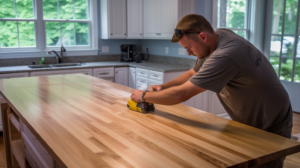
Keeping Wood Countertops Food Safe
Don’t panic – wood countertops are a food safe option as long as you use a food-safe finish. Some of your finish options for countertops that are appropriate for food preparation include the following:
- Food-grade mineral oil
- Linseed oil
- Beeswax
- Carnauba wax
- Walnut oil
At Baird Brothers, we offer several great, food safe finish and cleaning options: Howard Wax-It-All, Howard Butcher Block Conditioner, Howard Cutting Board Cleaner and Howard Cutting Board Oil. After your countertop installation, it’s important to re-oil the wood regularly (weekly for the first couple of months). After that, you can condition the wood once every month or two. Keeping the wood conditioned not only protects the surface but it also brings out the natural beauty of the product!
*Some woods, like pine and rosewood, excrete oils that aren’t safe to have in food-prep areas.
Butcher Block and Wood Plank Tops: The Most Beauty For Your Buck
Butcher block countertops and wood plank tops hold their own when stacked up against stone countertop materials, and often come at a much lower price. Not only that, but natural wood in the kitchen helps evoke the warmth of bygone eras while maintaining a modern appearance.
The versatility and longevity of the material make hardwood a wonderful choice for your kitchen remodel, and many people are choosing it as an accent for islands instead of using stone throughout the entire kitchen.
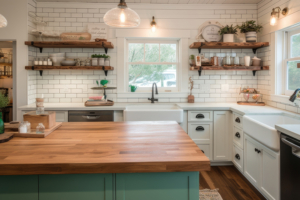
Find Beautiful Butcher Block Countertops at Baird Brothers
Now that you’ve read through the butcher block countertop pros and cons, you’re ready to start shopping for materials. Baird Brothers Fine Hardwoods has your back – we offer several high-quality options of butcher block and wood plank. When you’re ready to begin your kitchen remodel, shop our custom butcher block tops or plank style tops online, or contact us to talk through your project and options.
